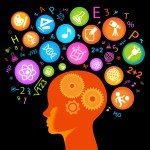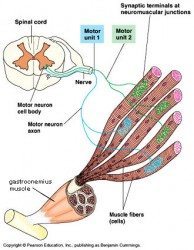 [1]Physical therapy can be more exhausting for the brain than the muscles. When recovering from an injury, a lot of concentration goes into firing the correct muscle, even if it just entails lifting your leg to the side. A patient once told me: “Lori, I feel like my glute is talking French and my brain understands German. Why is this so hard?” Why is PT so mentally exhausting? What is happening?
[1]Physical therapy can be more exhausting for the brain than the muscles. When recovering from an injury, a lot of concentration goes into firing the correct muscle, even if it just entails lifting your leg to the side. A patient once told me: “Lori, I feel like my glute is talking French and my brain understands German. Why is this so hard?” Why is PT so mentally exhausting? What is happening?
First, I always congratulate my patients for feeling mentally tired after doing their PT exercises; it means they’re doing them correctly. I use the mantra “quality over quantity” and ensure my patients understand that most PT exercises require focused concentration. The brain and the muscles are having a hard time communicating. The exercises will be more mentally exhausting than physically tiring because of the neuromuscular training taking place. Um, the neuro-what-o training?
 [2]Without getting too complicated, most muscles are composed of two different types of motor units: slow (1) and fast (2). Slow motor units are the ones we use most often in our daily function. These motor units have nerve endings that communicate with the muscle fiber; this is called the neuromuscular junction. At this junction, information is being sent to the muscle all the way from the brain or central nervous system (CNS). We know from research that when our body is not in pain, the CNS is able to coordinate multiple strategies to efficiently coordinate our functional and athletic movement. It’s an amazing system that we don’t even think about…until we have pain.
[2]Without getting too complicated, most muscles are composed of two different types of motor units: slow (1) and fast (2). Slow motor units are the ones we use most often in our daily function. These motor units have nerve endings that communicate with the muscle fiber; this is called the neuromuscular junction. At this junction, information is being sent to the muscle all the way from the brain or central nervous system (CNS). We know from research that when our body is not in pain, the CNS is able to coordinate multiple strategies to efficiently coordinate our functional and athletic movement. It’s an amazing system that we don’t even think about…until we have pain.
Pain does a funny thing to the body. In general, pain affects the slow motor unit more than the fast motor unit. The slow motor unit reacts to pain by forgetting how to sync itself with the brain and muscle. This forgetfulness can manifest as poor recruitment (muscle sleepiness), delayed timing and/or altered muscle patterning. The fast motor unit reacts by: “Let me help you! I can do your work! I know I’m a quadriceps muscle, but I would love to help you move your leg to the side, even if I’m not supposed to.” The fast motor unit can be likened to the micro-manager: when the slow unit has decided to call in sick, the fast motor unit will try to accomplish all of the tasks as the slow unit…and take all of the credit. But this compensation comes at a price. The price? Pain and dysfunction.
This is where physical therapy plays a key role. PT teaches the altered and painful neuromuscular patterns to behave once again as they did without pain. It takes time, patience and brain power, but this principle is one of the coolest things about our bodies. With the right exercises, the muscle and brain can have a great conversation again and heal the body back to normal in order to Move Happy!
Case Study
I’m currently treating a patient who is an accomplished Pilates instructor and student. She knows how to move her body. However, she has been dealing with left knee pain for almost a year and started to have compensatory movement patterns. More than that, when she lifts her leg out to the side (abduction), she cannot feel her gluteus medius AT ALL. The gluteus medius is the MAIN abductor of the leg, but her vastus lateralis (one of the quadriceps muscles!) decided to take over the role of abduction and let the gluteus medius go to sleep. All of this because her left knee started to hurt. (Remember, pain starts to shut down the slow motor unit; gluteus medius falls in that category.)
After some neuromuscular training, she was able to sense her leg moving to the side from her gluteus medius…and it was exhausting. Thinking about how to fire the correct muscle was like trying to solve a complicated math equation. The brain power required to sync her central nervous system to her hip muscle was more difficult than she ever thought it would be. Luckily, her gluteus medius gave her some great feedback the next day: it was sore because it was finally working again!
© 2014 and Beyond. ALL BLOG CONTENT at duncansportspt.com by Lori Duncan PT